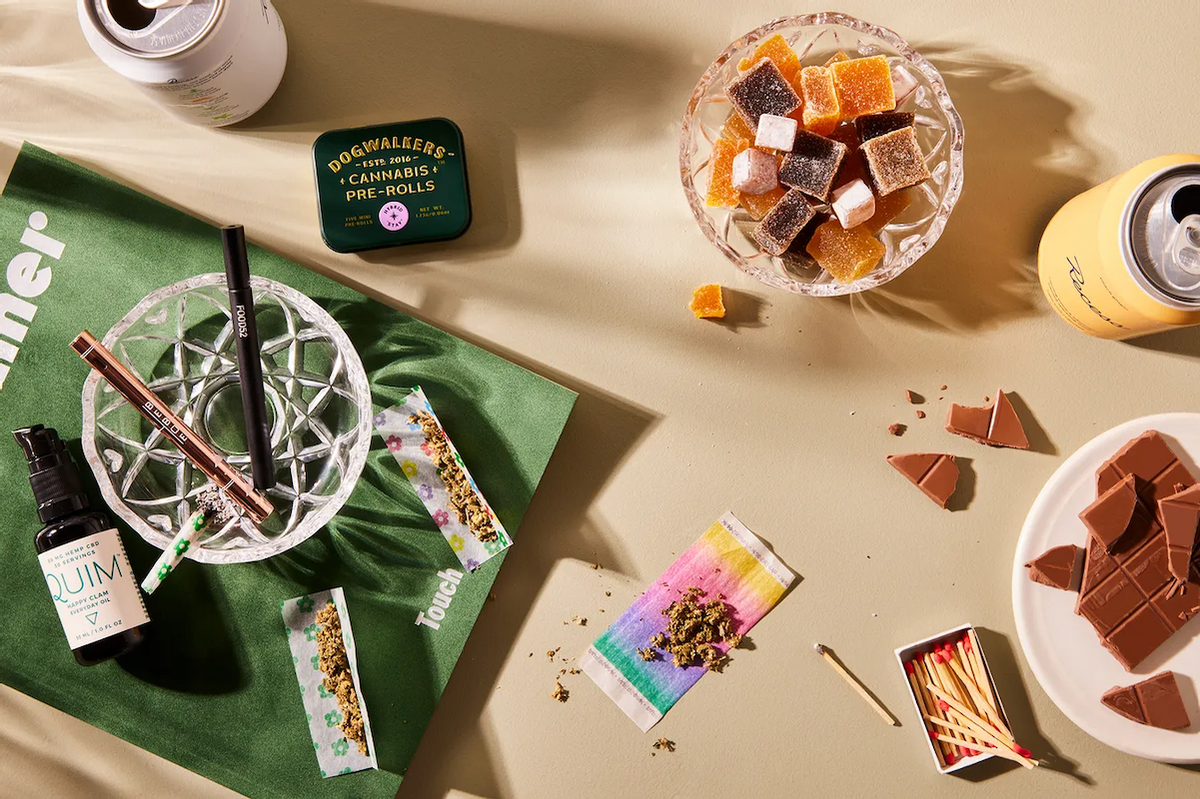In The Green Scene, there's no such thing as a silly question about cannabis. What's the difference between THC and CBD? How the heck do I make edibles at home? What home design advice can dispensaries teach me? Kick back — we have the answers.
Seemingly overnight, the cannabis industry has, quite literally, bloomed. To say that the marketplace has become overcrowded with CBD and THC products would be an understatement. Wellness stores, both online and brick-and-mortar, and cannabis dispensaries sell a range of gummies, oils, balms, and smokable flowers that claim to help you sleep better, soothe sore muscles, and generally make you feel less stressed. It's a lot to take in, especially if you're still confused about what the difference is between CBD and THC. Like does this peach-scented lotion contain weed? Will I get high off CBD seltzer water? If I eat one of Martha Stewart's fruity gummies, will I fail a drug test?
THC and CBD, explained
CBD (short for cannabidiol) and THC (short for Tetrahydrocannabinol) are both chemical compounds derived from the Cannabis sativa plant (aka hemp plant, aka weed, aka marijuana, aka pot, aka Mary Jane…you get the picture). So how do they differ from each other? CBD is a non-psychoactive natural compound, which means that you won't get high from consuming it; THC, on the other hand, will have psychoactive effects. According to Kyle Hammerick, the Chief Science Officer at Colorado-based cannabis company Escape Artists, "CBD and THC molecules have the same number and types of atoms but they differ in how the atoms are arranged. It is this slight difference that causes delta9-tetrahydrocannabinol (delta9-THC) to have different psychoactive properties from CBD. The different conformation of THC allows it to engage receptors in the brain called cannabinoid 1 (CB1) receptors while CBD does not bind to these receptors."
While THC is consumed for both recreational and medicinal purposes, and a wave of legalizations have made it much more available in many states, it remains federally illegal. CBD on the other hand is more widely available and legal, though its status is still complicated. It also presents a whole slew of mental and physical benefits, such as a way to help manage chronic pain and anxiety. "Because everyone's biology is different, CBD has different effects on different people, but the most common effects from consumption include a sense of calmness, focus, clarity, anti-inflammation, and pain relief," says Nancy Einhart, editor-in-chief of House of Wise, a luxury CBD and wellness brand. THC and CBD are alike in that both can be found in products ranging from smokeable flower, food and beverages, tinctures, and balms. Because CBD is more widely accepted as a "wellness ingredient," you'll find a range of topical products in gift shops, big box retailers, and beauty stores. Scroll through Sephora's website and you'll find CBD oils, body lotions, anti-aging serums, stiletto cream, bath soaks, bath salts, and perfumes. The same cannot be said for THC products, which remain illegal in some form in more than half the states across the country.
Legalization of CBD and THC
Tens of thousands of people — particularly brown and Black Americans — are still incarcerated for low-offense drug crimes such as possession of cannabis in the United States. According to the American Civil Liberties Union, more than six million arrests for cannabis possession occurred between 2010 and 2018, and Black people are still more likely to be arrested for cannabis possession than white people in every state, including those that have legalized cannabis.
While cannabis's legal status evolves rapidly and inconsistently on a state-by-state basis, the legal status of CBD is a little different, if equally unclear. Cannabis is currently legalized, including for recreational purposes, in 18 of the 50 states. Ten states have a mixed legal status, meaning that cannabis is decriminalized and approved for medicinal purposes only. On the other hand, nine other states have not decriminalized cannabis but have approved it for medicinal usage. Two states — North Carolina and Nebraska — have decriminalized cannabis, but it remains fully illegal in all forms, which is all kinds of confusing. In seven states, CBD oil has been legalized for medicinal purposes, but cannabis remains criminalized. And cannabis and CBD remain fully illegal in all forms in four states — Idaho, Kansas, South Carolina, and Wyoming.
So what exactly does this mean for consumers of CBD and THC?
FAQ
Is CBD legal?
Yes, within certain parameters. Let's review the 2018 Farm Bill (stick with me here): "the plant Cannabis sativa L. and any part of that plant, including the seeds thereof and all derivatives, extracts, cannabinoids, isomers, acids, salts, and salts of isomers, whether growing or not, with a delta-9 tetrahydrocannabinol concentration of not more than 0.3% on a dry weight basis."
In essence, if any product contains less than 0.3% of THC, it is not considered a controlled substance (aka an illegal drug) under federal law. When talking about CBD and legal forms of cannabis, you'll likely hear the phrase "full-spectrum CBD" tossed around. "Full-spectrum CBD products contain less than 0.3% THC and offer little to no high whatsoever. But because full-spectrum CBD contains more than 80 different cannabinoids and compounds, we think it's the most effective by far, due to the entourage effect, which is the term used to describe the enhanced effects of cannabinoids, such as THC and CBD, when they work together rather than alone," says Einhart.
Does CBD make me hungry?
Sadly, no, you probably won't get the munchies after consuming a couple of CBD gummies. THC is the chemical that you can thank for boosting your appetite and levels of dopamine. "THC can increase the sense of smell and taste, so people are more inclined to want to eat," Janice Newell Bissex, a registered dietitian and holistic cannabis practitioner, told The Washington Post. Eating say, a sleeve of Chips Ahoy or a basket of chicken fingers, after consuming a product that contains THC, will become more enjoyable.
Is CBD FDA-approved?
Very few CBD products are approved by the federal government. In fact, only one cannabis-derived product and three cannabis-related drug products have been approved by the FDA: Epidiolex, which is a "purified form of the drug substance CBD," is used to treat two rare forms of severe epilepsy in anyone older than 12 months; Cesamet, Marinol, and Syndros are the other three oral products that have been authorized by the FDA for therapeutic use. "Marinol and Syndros are both drugs containing dronabinol or delta9-tetrahydrocannabinol that are approved for treating nausea and vomiting caused by chemotherapy. They are also used to treat loss of appetite and weight loss in people who have acquired immunodeficiency syndrome (AIDS)," says Hammerick.
There are thousands of cannabis-derived and cannabis-related products on the market, but no others currently have FDA approval (despite any claims certain brands may make).
So how do you know if the CBD you're getting is safe and effective? "There are many different types of CBD products, but not all brands are created equal. Quality and efficacy can differ drastically, so make sure you are buying your CBD from a trusted, established brand with a solid reputation. An important thing to look for in CBD products are verifiable lab tests. Lab testing is not required by law, but it's an important assessment that brands can voluntarily opt into to ensure quality and potency," adds Einhart.
How long does CBD stay in your system?
There's no easy answer to this. Physical factors (such as your weight and age), the form of consumption (did you smoke it? Was it a gummy? How about a can of seltzer?), how recently you consumed it, and how often you consume it can all affect how long CBD stays in your body. On average, CBD tends to appear for one to three days after consumption, but a study conducted by Mayo Clinic found that metabolites appeared in some patients up to 15 days after usage. While you won't feel the effects of CBD for more than a few hours, it may appear in a drug test more than two weeks after you consumed it. Which leads me to…
Will CBD ruin a drug test?
Maybe, maybe not. A 2019 study conducted by researchers at John Hopkins University found that one-third of participants tested positive for cannabis after vaping a CBD product that contained 0.39% THC. This is not significantly higher than the legal limit of THC and in a largely unregulated market of CBD, it can be difficult for consumers to know how much THC they're consuming, says Einhart.
Will THC show up on blood work? What about a drug test?
Cannabis testing (and other types of drug tests) are typically done with a urine sample. According to two studies, THC will appear in a urine sample at least 95% of the time. "Broad-spectrum CBD and CBD isolate will not make anyone fail a drug test. It's possible that the trace amounts of THC in full-spectrum CBD could show up on a drug test, so if you want to be really safe, avoid full-spectrum CBD and stick to broad-spectrum or isolate," says Einhart.
Will CBD make me tired?
Consuming CBD products won't immediately make you tired, per se, but they have been known to help you sleep better at night. Some of the most common reasons why consumers take CBD products are to help them snooze longer, regulate stress, and treat insomnia. A 2019 study found that 79.2% of patients experienced decreased levels of anxiety and 66.7% of patients had improved sleep after one month of consuming CBD. However, more research is needed to determine what the best type of CBD products are, and how much you should take, to best improve your sleep.
Does THC help chronic pain?
There is inconclusive scientific evidence that THC can help pain and nausea, but anecdotal evidence proves it can. Sensing a pattern here? There's a lot more scientific work to be done around both THC and CBD. But if it's legal where you are and you're curious, CBD is widely available now in so many forms and there's no reason not to give it a try.


Shares